In all its different shapes and forms, urban art has been a crucial part of London for decades. Visiting neighborhoods like Camden or Shoreditch, there’s barely a street you can walk down without spotting some amazing murals. In this post, I’m introducing the best street art London offers in the area around Camden. Then, in the second part, we continue our chase for street art in the hunting grounds of Shoreditch in the Eastern part of the city.
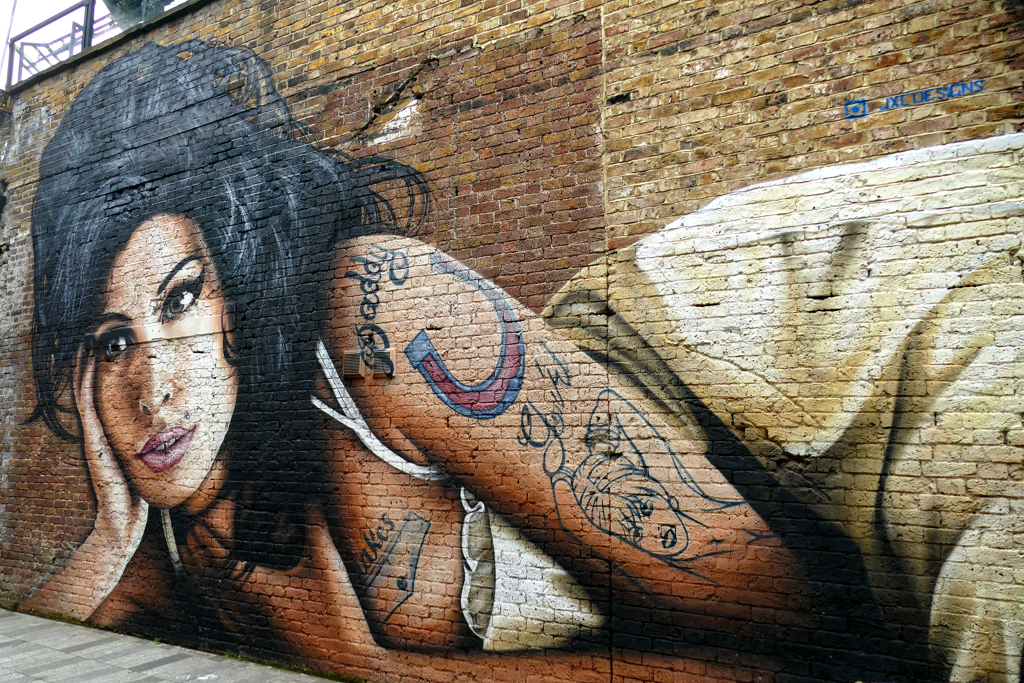
Street Art in London
The history of street art in London can be traced back to the underground music and art scenes that emerge in the late 1960s and early 1970s. This was the heyday of mods, skinheads, and punks. But let’s not forget the teenagers in the neighborhoods that were predominantly inhabited by migrants from the Commonwealth like for instance Brixton. There, street art was rather influenced by the hip-hop movement coming over from the US in the 1980s. Either way, graffiti was primarily about setting a sign and gaining acceptance within a particular peer group. The fact that it was illegal to paint on public walls and dangerous to spray on trains only added to the myth’n’hype.
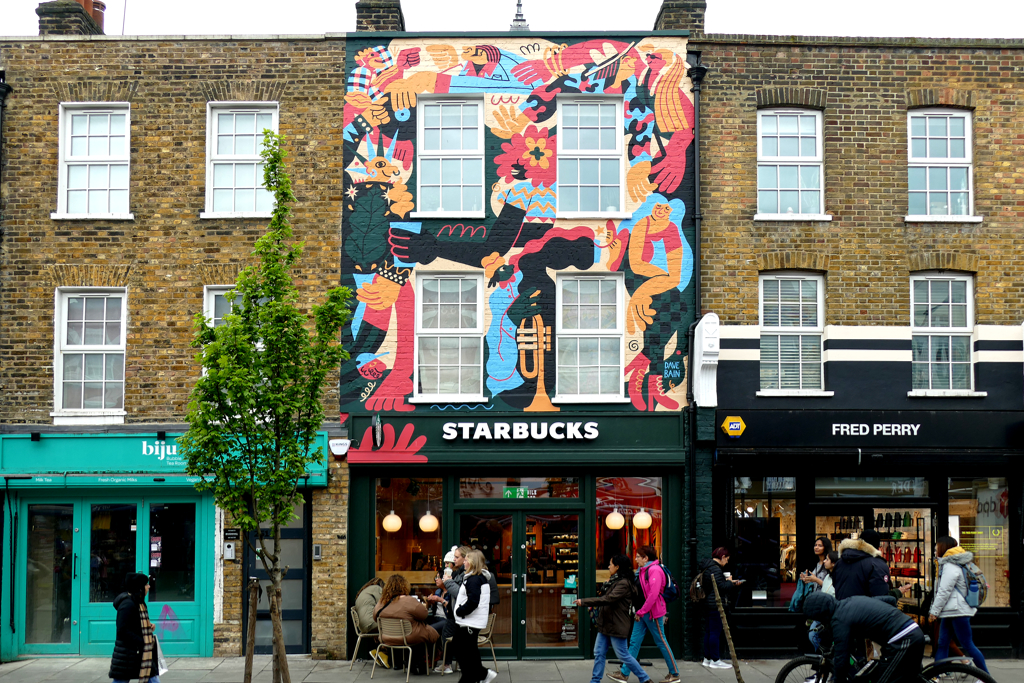
Although graffiti is still technically illegal in London, gone are the days when spraying walls as a whole was considered vandalism. Over the years, murals became an important part of contemporary art, and artists in baseball caps and sneakers are making good money with their skills. If you ask me, that’s at the same time the problem with street art: It loses its swag. No matter how talented a street artist is – and some of them have just incredible skills – as soon as a questionable global player like Starbucks commissions you to embellish their facade, it drains even the last drop of subversion from your piece, obviously.
Grey Area – Metaphorically Speaking
As I mentioned above, muraling is technically illegal in Great Britain. Consequently, authorities often remove or conceal illegally sprayed tags’n’murals. For this reason, I decided to introduce only some of the most outstanding murals in this post. Because with all those small and fun pieces, chances are they’ll be gone by the time you make it to London. Street art tends to be a very fast-moving trade. Also, sadly, some talentless vandals self-proclaimed artists enjoy smearing their pointless tags across wonderful pieces of true art that ruin them forever.
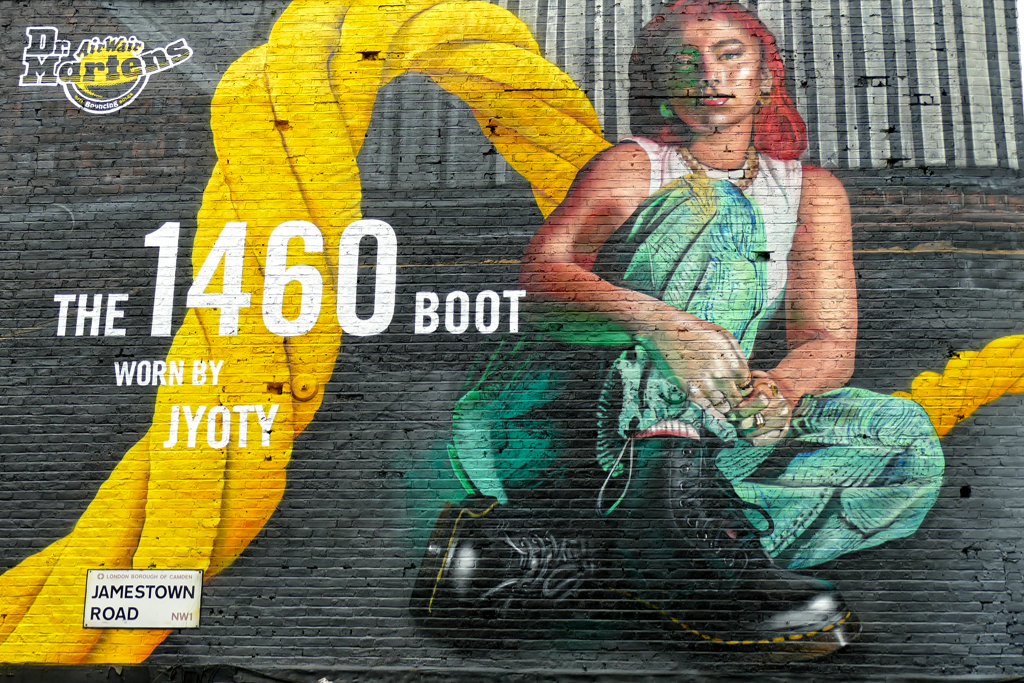
Although works by urban artists like Keith Haring and Banksy became a bit hackneyed over the years – it’s simply not exactly subversive seeing their pieces in exhibitions, on mugs, and baseball caps, they opened the doors for acceptance and appreciation.
Yes, it’s definitely a nice thing when house owners offer walls for legal spraying. But I have mixed feelings when it comes to agencies that facilitate commissional work for artists. This way, big companies can maintain a hip and trendy image. Yes, it’s great that artists have the chance to legally put their work out there and make a living. Obviously, I don’t know how far they are free to choose the motif. Can Dave Bain paint a mural depicting exhausted coffee pickers on the facade of Starbucks? I don’t know, I haven’t read the contract.
Yet, I’d assume that in many cases, advert murals are just one step from any white-washed house.
I totally understand that being commissioned by a major brand is huge, and for instance, Banksy became so famous that today, his murals are auctioned for hundreds of thousands. Nevertheless, this is very far from the origins of street art.
Street Art in Camden
When Greater London was established in 1965, also the Borough of Camden was suburbanized. Camden is a residential district rooted in the late 18th century. It became an important location during the early development of the railways.
In 1816, the Regent’s Canal was built through the area. To this date, you can trace deep marks in the handrails around the bridges. They stem from the towropes by which horses pulled barges. Also, there are still ramps on the bank that assisted horses to come ashore after they fell into the water when startled by the noise of a train.
Over the decades, the area’s heavy industry has been replaced by quirky retail and entertainment. However, up to the mid-20th century, Camden was considered a lower-class neighborhood. Eventually, subcultures like the punk movement took over, and finally, the former cradle of alternative scenes became a popular tourist spot.
What’s Left
Over the past years, Camden degenerated from a cradle of alternative scenes into a popular tourist spot for the whole family. Camden Market gets 500,000 visitors each week. This way, it became the fourth most popular attraction in London. Hence, you can spot young-at-heart fathers taking selfies with their teenage offspring. Only the heavily pierced punk posing for some change next to the entrance to Camden Lock Market reminds us of the good old days when this was subversia.
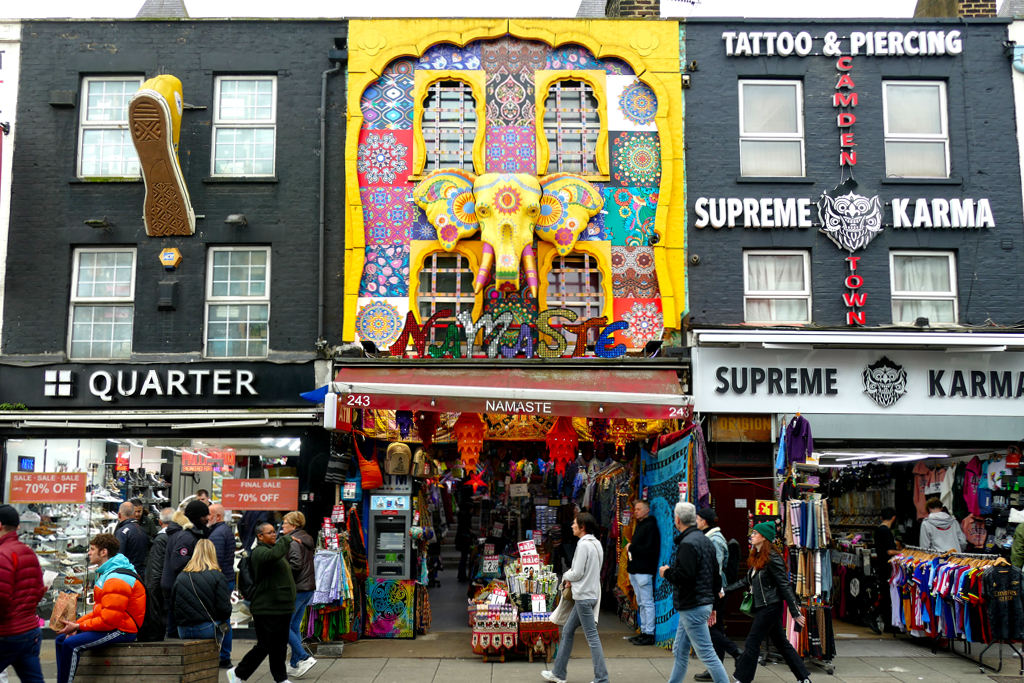
Actually, this gentrification is something London’s street art hotspots Camden and Shoreditch have in common: From the underdog to the trendy bohemian. Obviously, this dubious development is unintentionally fueled by organizations promoting urban art. Even if the initial intention was to improve the neighborhoods’ quality of life by embellishing weathered structures, it foremostly increased commercialization.
The Destruction Of Lana Del Rey
But as a recent example shows, commercialization and passion are not mutually exclusive: The side wall of a tattoo parlor facing Stucley Place has been kind of a billboard for changing murals. In accordance with the landlord, murals are often commissioned through agencies like the mega player Global Street Art. These deals are determined for a certain period of time, obviously.
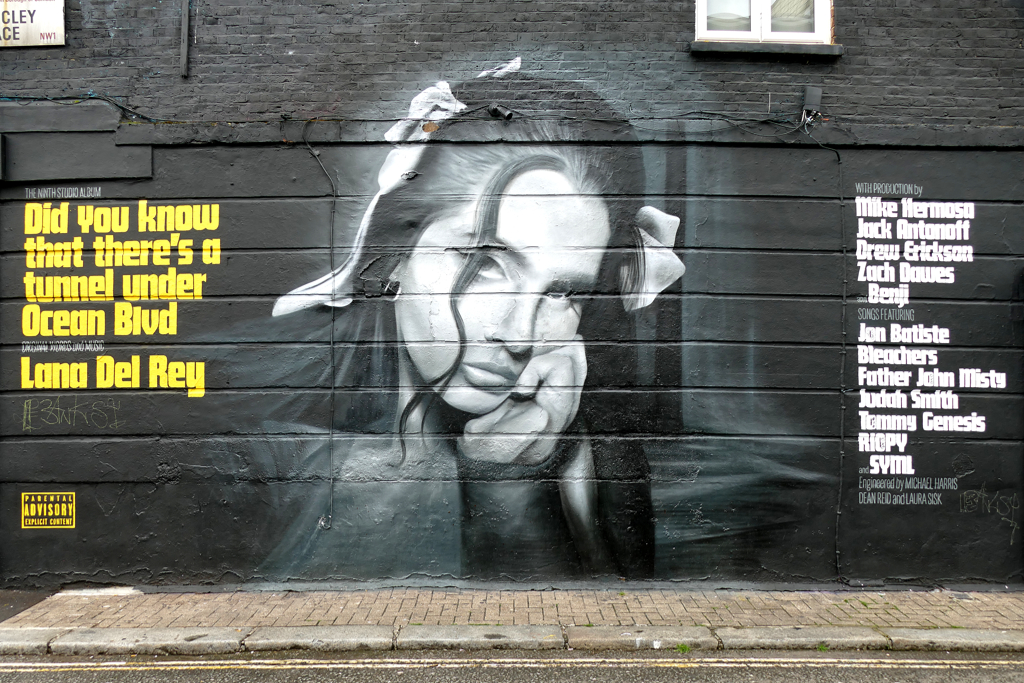
Hence, then came the day when Lana’s time was over – metaphorically speaking – and the wall was painted by Hungarian muralist Mr. Zero.
Now, I must say that I’m not the greatest fan of his work, but to each their own. After all, Mr. Zero did not just smear something willy-nilly on the wall. No, he sprayed with the permission of the owner of the building.
Others, however, were much less chilled about it. Furious fans claimed that “Lana Del Rey’s Mural in Camden Town was completely vandalized”. Others expressed their hope Mr. Zero would die.
Well, he will die eventually – like all of us. But until then, he’s free to leave his mark legally wherever he pleases. As he said: Transiency is in the nature of graffiti and street art.
With this being said, I’d argue that it’s still worth your time to pay good old Camden a visit just to see the murals that I’m introducing in this post in their natural habitat as long as you can. And with that, I’m referring to the murals’ transiency, not yours.
The Artists
While in some of my posts on street art, I’ve listed the works according to their creators in alphabetic order, in Camden, I’m taking you on a walk from the subway stop Mornington Crescent northward all the way to the area around Camden Lock Market. Although the distance is only about 1.5 kilometers, you should plan about two hours since there will be many detours and possibly some posing in front of the murals.
JXC
I’m beginning the list with an amazingly quirky portrait that London-based artist JXC painted at the corner of Miller Street and Camden High Street.
Josh Colwell aka JXC is mainly famous for amazing hyperrealistic portraits. He gets inspiration from nature and from real people, but also from coming’s book characters.
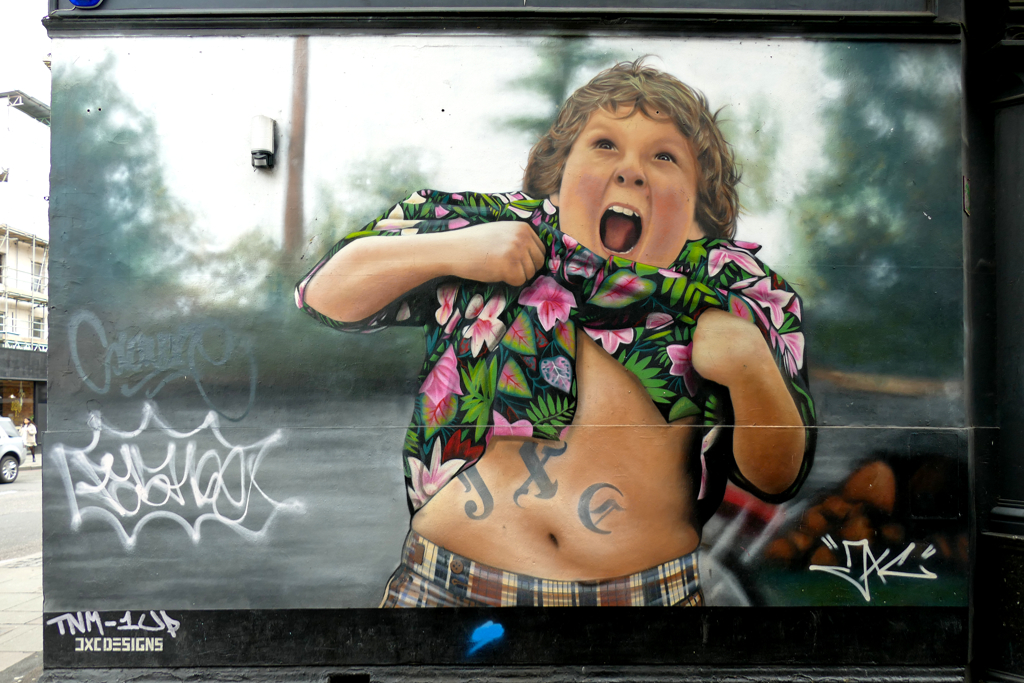
This post’s cover photo depicts Colwell’s fantastic mural of the late singer Amy Winehouse who was working in one of Camden’s quirky shops before becoming a big star.
Damitta
Women are still absolutely underrepresented in the field of street art. One of the women who is represented with several works in Camden is Damitta. Damitta aka DMT Art is originally from Spain and is now based in London.
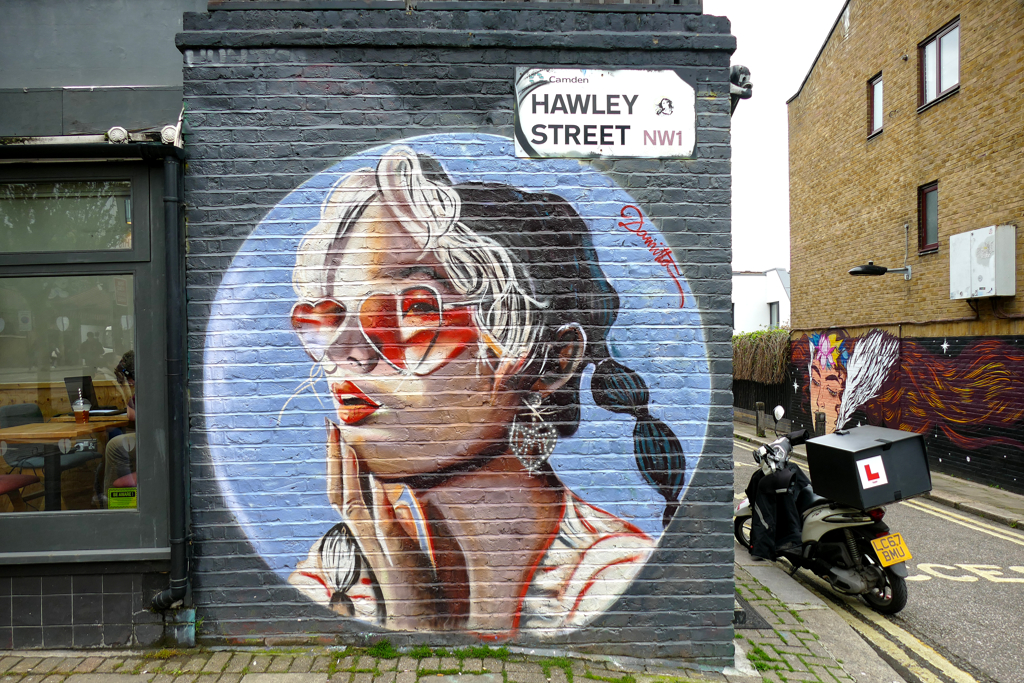
Damitta began her street art career by lettering and painting backgrounds for other urban artists. Eventually, she developed her own style and has embellished walls with her portraits of sensual women ever since.
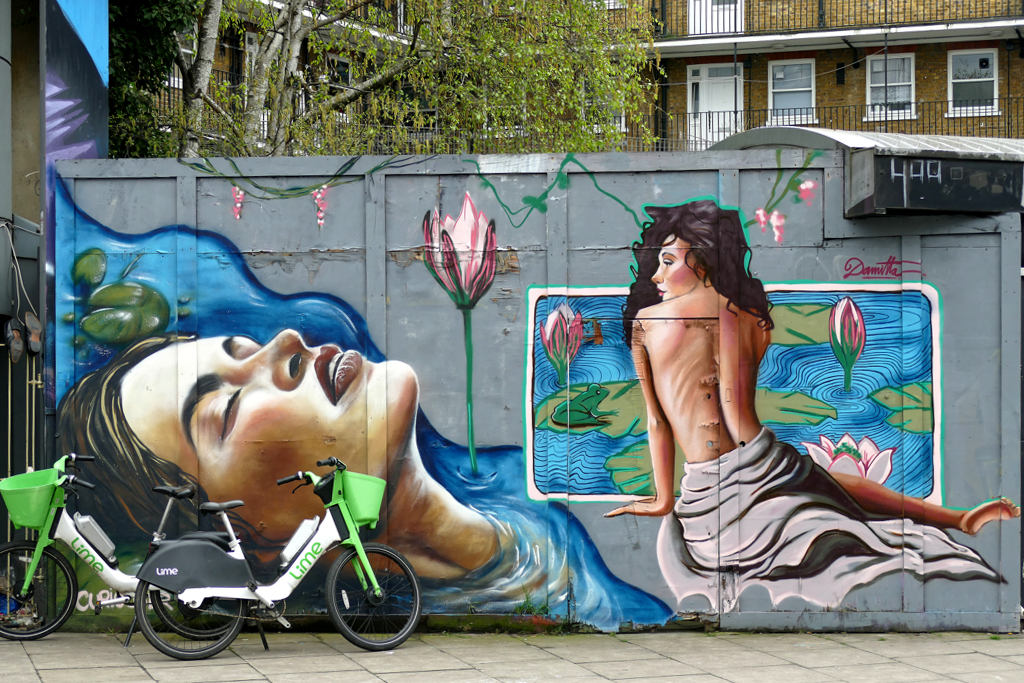
Curiouser
The artist that goes by the name of Curiouser is originally from Italy. She has been based in London where she successfully paints in cooperation with Dave Plants. Interestingly, the large portrait she created next to Damitta’s nude lady is one of her rare solo projects.
Dan Kitchener
Another one of my favorites is Dan Kitchener. Kitchener aka DANK is a British artist based in London. He’s another master of spray cans who never uses grids or stencils for his amazing murals.
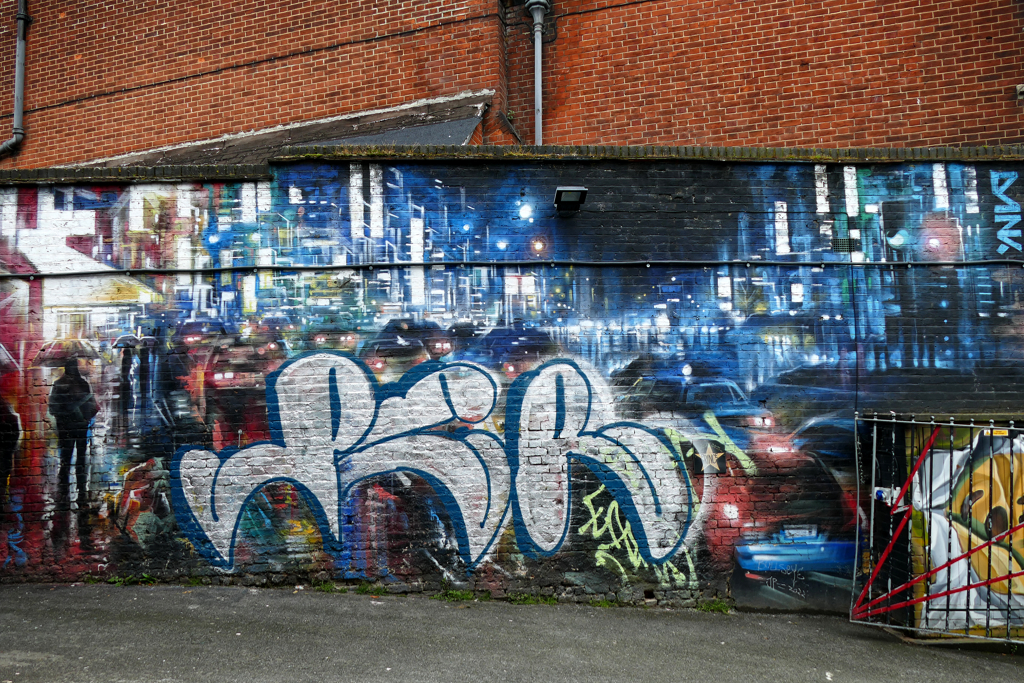
He creates those fantastic moody street scenes in the rain. The seemingly tangible atmosphere of his murals actually seems to suck the viewer in.
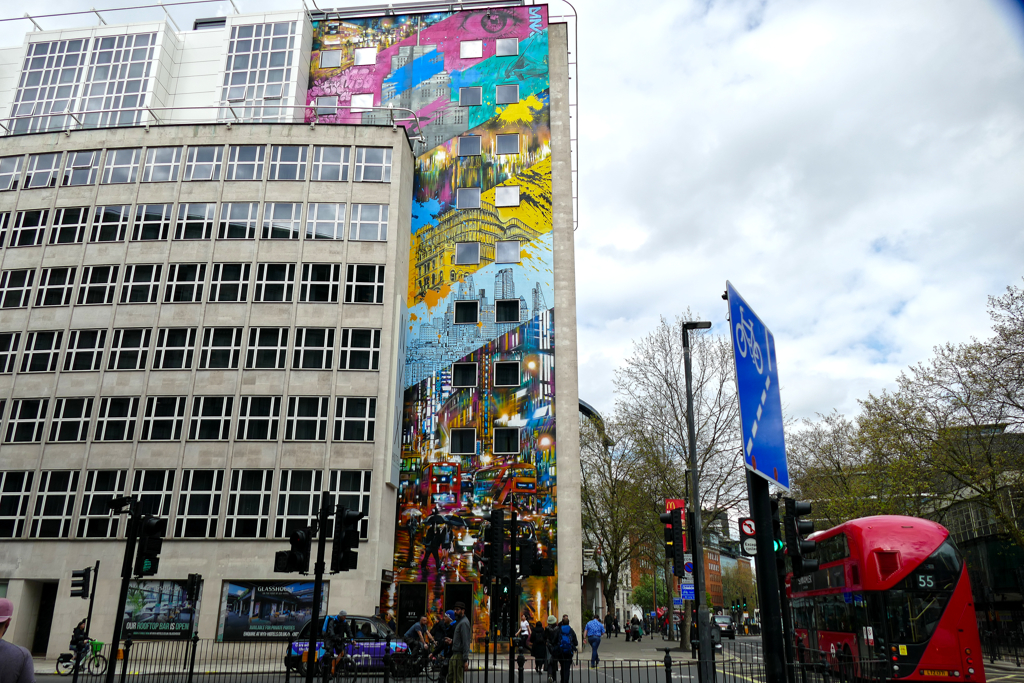
Over the years, they made him one of the leading urban artists worldwide. You will immediately recognize his murals in many European cities like Amsterdam, Berlin, Hong Kong, Tokyo, and London, obviously.
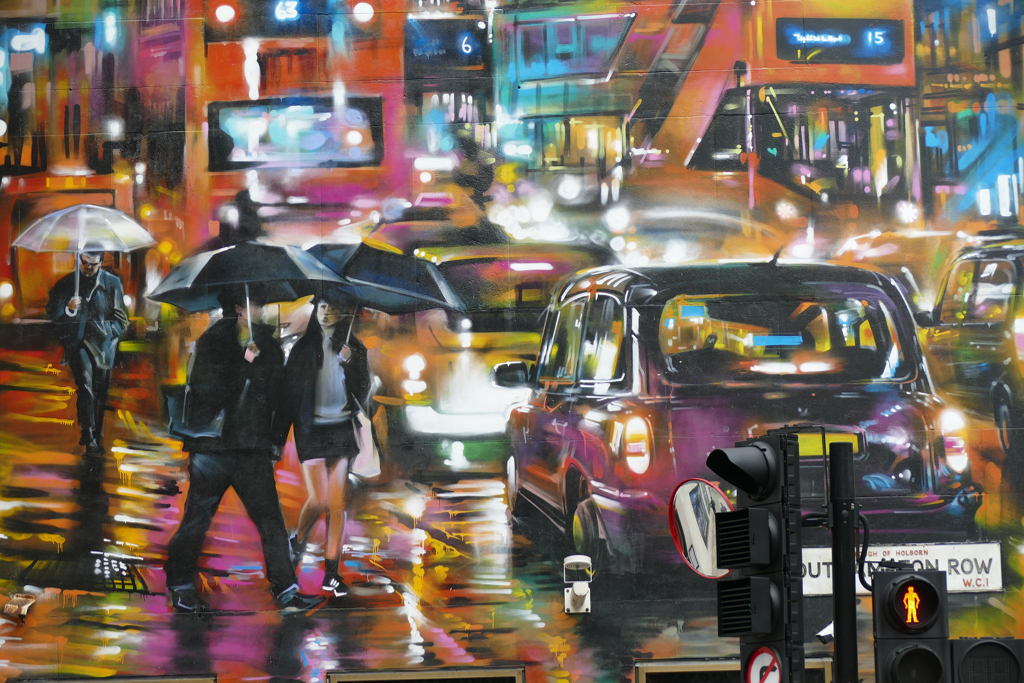
During his artistic career, Kitchener has worked with celebrities like Kylie Minogue, Miley Cyrus, Paul McCartney, and Lenny Kravitz, to name just a few.
I’ve introduced Dan Kitchener in former posts about street art in Amsterdam and Bristol.
Ant Carver
Ant Carver was born in 1991. He holds a degree in Fine Art from Oxford Brookes University. As a matter of fact, you can immediately see this academic background in his artistically mature portraits.
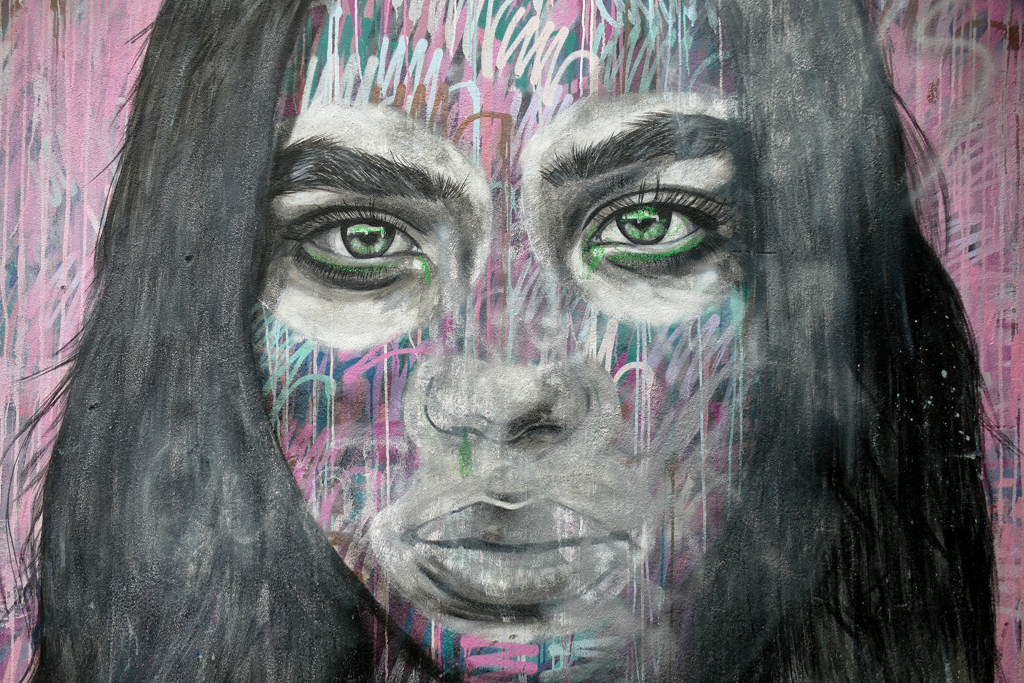
Working on the street as well as in his studio in London’s Whitechapel, he applies classic oil painting techniques on aluminum panels; or on concrete walls, obviously.
His hyper-realistic portraits are covered by abstract marks and hatched elements.
I’ve introduced Ant Carver in a post about street art in Bristol.
Xander Coy aka Zandism
Xander Coy is actually one of those artists that were born in Camden. Under his pseudonym Zandism, he paints in acrylic and oil, but also crates using ink, and spray paint, obviously. His style is influenced by Surrealism and Pop Art which you can clearly see in the portrait below: Although it’s in black and white, hence, missing the psychedelic coloring of that time, the appearance is clearly influenced by the 1960s and 1970s.
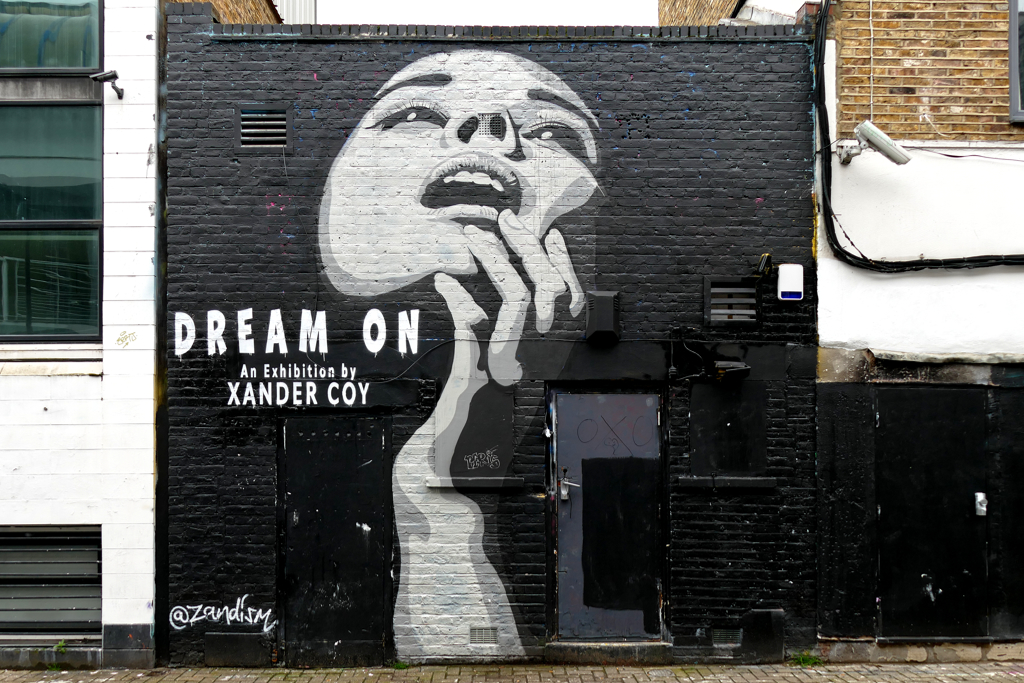
He aims at combining the mastery of classic painting with the anarchic concept of street art. Juggling hyper-realistic portraits and surreal settings underlines the emotional message of his paintings as does his choice of vibrant colors. Admittedly, the above portrait in black and white is clearly an exception.
AeroArts
Aero started, like many street artists, by drawing and sketching letters on paper. Eventually, he began to transfer his sketches on walls in the early 1990s. Through his passion, the self-taught artist perfected his skills.
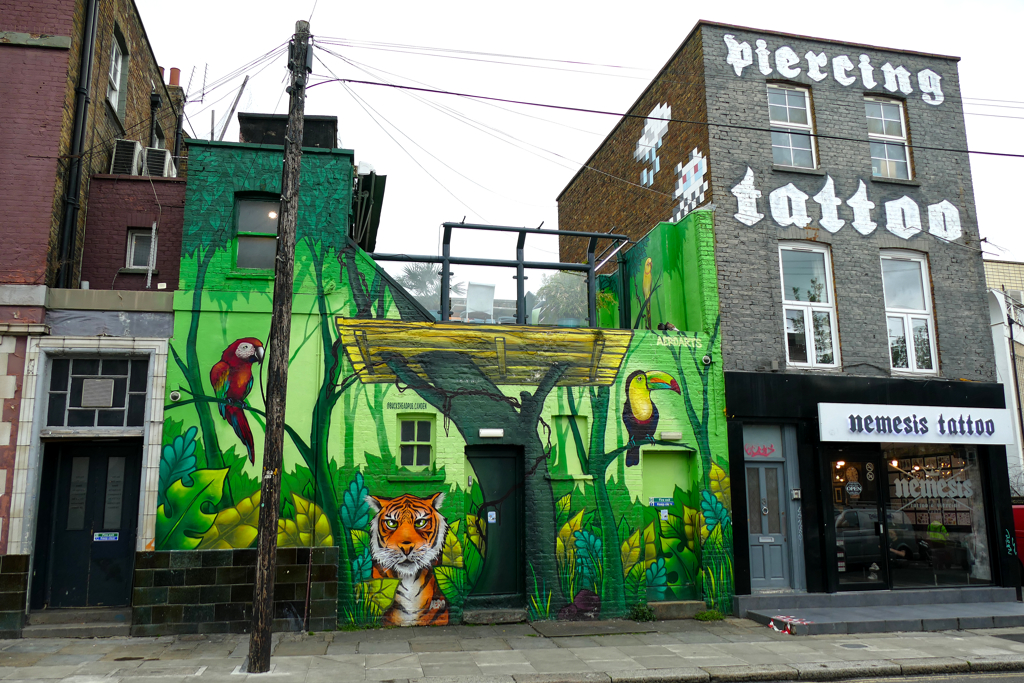
After he was asked to paint murals for a local youth service, he got involved in graffiti workshops and programs within the local community. This way, he transitioned from lettering to creating large murals in public spaces. Today, Aero combines his passion for graffiti with artistic social work by offering workshops. This way, he motivates adolescents to engage in creative processes. An appreciated side effect is the embellishment of their neighborhoods.
REVES
Growing up in the Belgian capital Brussels, REVES started creating art at a very young age. Due to his background in film production, motion is an important topic in many of his creations.
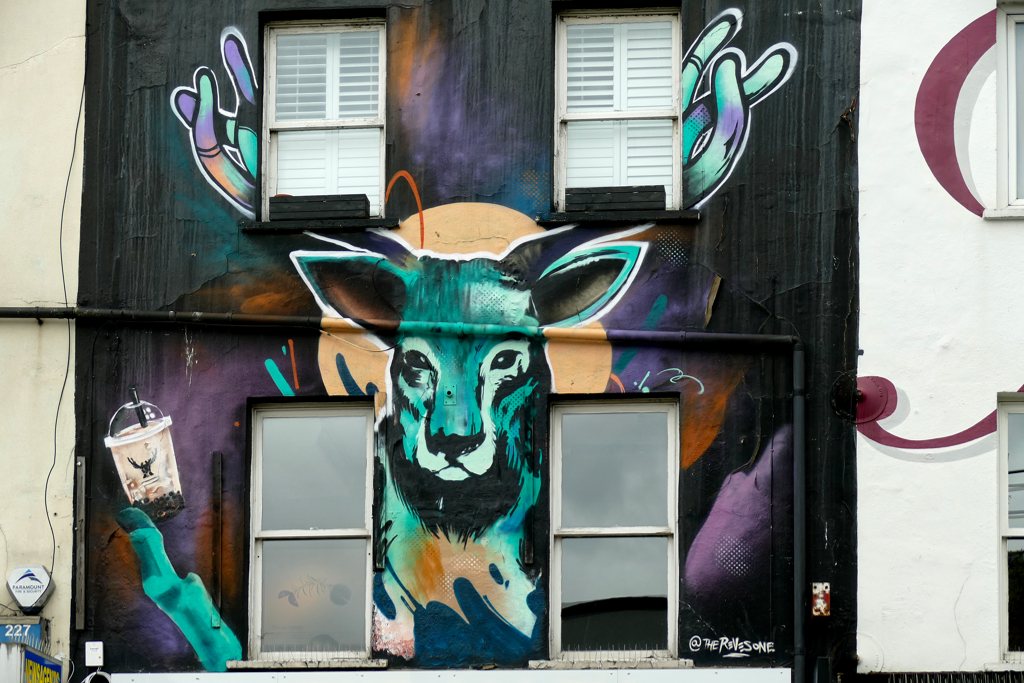
When he was only 15, he participated in group exhibitions like the prestigious art event Museum Night Fever in Brussels. Eventually, he hit the road and embellished walls in Barcelona, Berlin, Bangkok, New York, Paris, and Prague, to name just a few. In Oxford, he painted a four-storey tall mural which is said to be the largest one in the entire city.
KOBRA
KOBRA was born Carlos Eduardo Fernandes Léo in the Brazilian city of São Paulo in 1975. He allegedly began his career at the tender age of 11. Considering the number of around 3,000 larger-than-life murals that he has painted since then, this age statement seems absolutely credible to me.
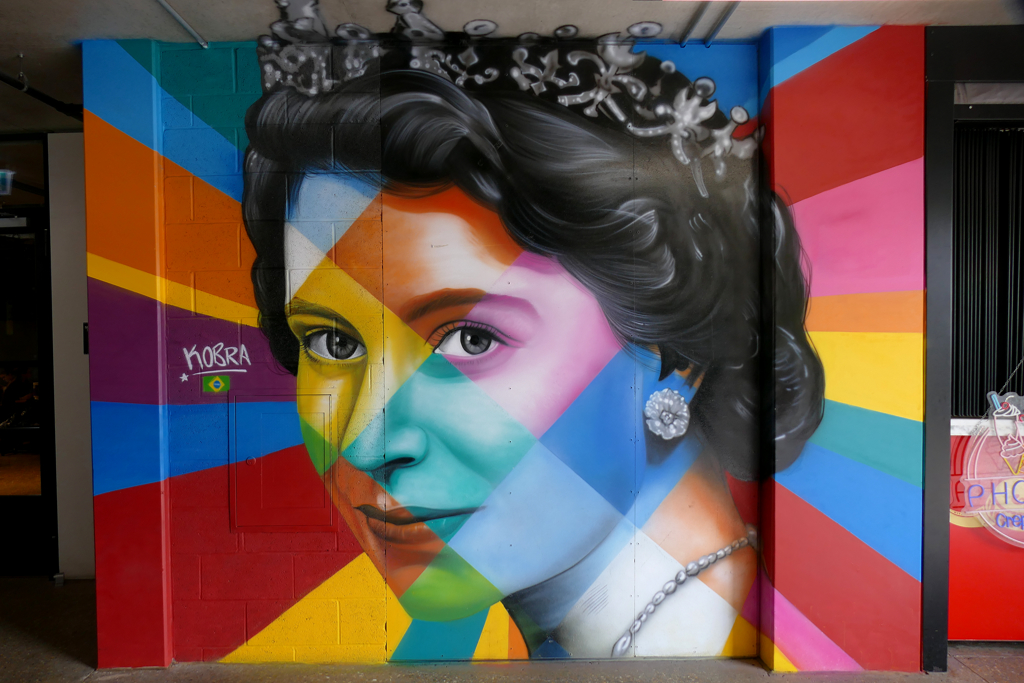
However, KOBRA started as subversive as almost every urban artist, namely as an illegal tagger. He got arrested three times for his passion. Illegal? Sure! But talented? As a matter of fact, one judge was so impressed by his talent that he sentenced him to….paint. He commissioned KOBRA to create a mural on the wall of a police station of all places!
Today, KOBRA is unquestionably most famous for his hyper-realistic portraits of notable people that he paints over graphic patterns of geometric shapes in bold colors.
In 2016, on the occasion of the Olympic games in Rio de Janeiro, Eduardo Kobra was invited to create a giant mural. Las Etnias, Ethnicities, measures over 32,000 square feet and therefore made it into the Guinness Book of Records.
But as the art world keeps on turning, today, Las Etnias is ranked 9th worldwide.
I’ve introduced KOBRA’s work in my posts on Amsterdam, Sao Paulo, and Rio de Janeiro.
TamOonz
Another lady I came across in Camden is Tsakhnakia Tamuna. In the street art scene, she goes by the name of TamOonz. The fact that she’s from Georgia’s capital Tbilisi makes her an even more exotic creature in the male-dominated sphere of spray cans.
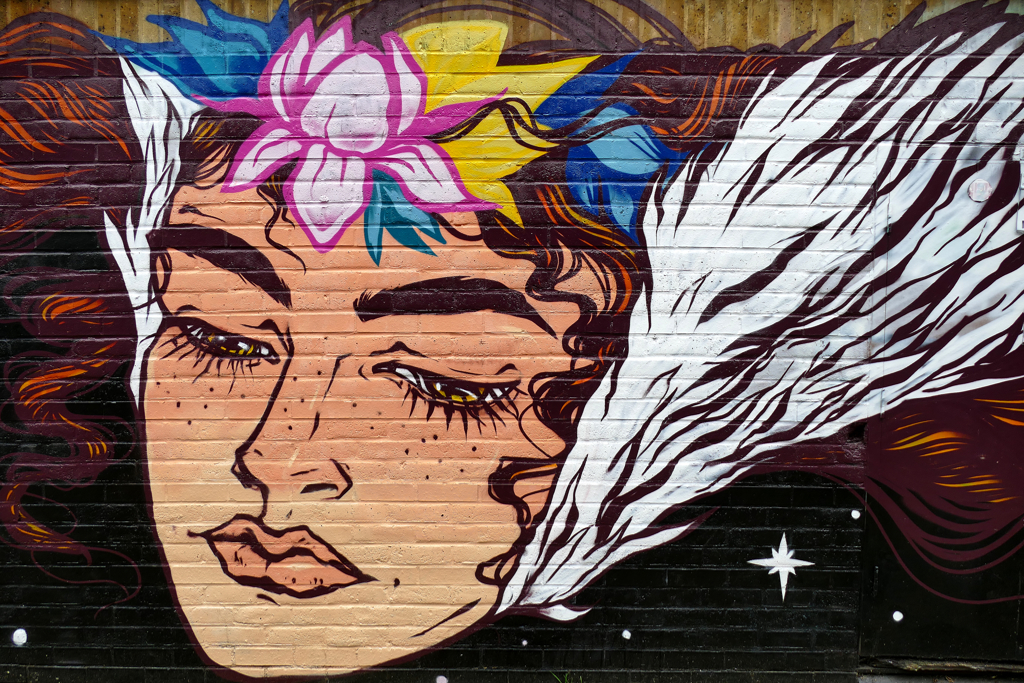
Although she graduated from Tbilisi State Academy of Arts with a master in Media Art and Graphic Design, TamOonz had been intrigued by street art from an early age. In her home Georgia, she belongs to the first generation of urban artists. She was first invited to participate in an international street art festival in 2012. Today, Tamoonz is an avid member of the global family of urban artists.
Airborn Mark
Born in Poland, Airborne Mark has been living in London for over a decade. As a street artist, he found a truly unique niche: He depicts creations that were first beautifully folded in traditional Japanese origami technique; and he’s been doing that for about 20 years now.
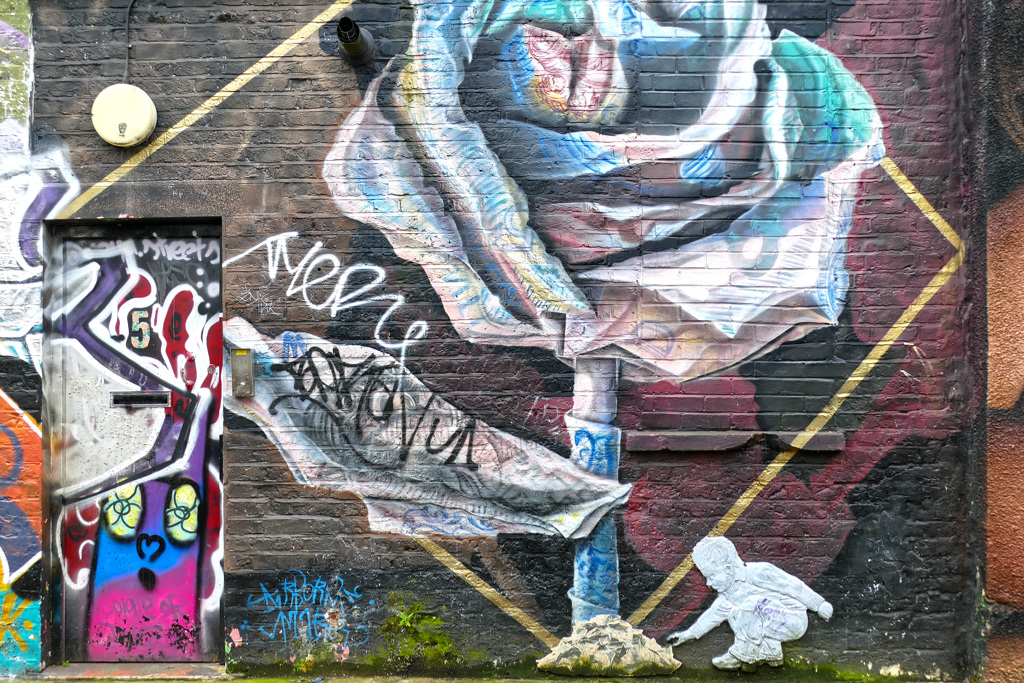
Airborne Mark’s creates his studious designs according to tangible paper models. Meticulously constructed paper folds are the base of his extraordinary and outstanding style. Upon completion of a mural, he ritualistically burns the origami model. This way, he emphasizes that the tender paper fold as well as the image exposed to the elements won’t last forever.
Airborne Mark’s murals unfold before your eyes in Germany, Italy, Kosovo, Poland, Portugal, and Switzerland.
Leon Seesix aka Dotmaster
Leon Seesix aka Dotmaster graduated in graphic design from Chalmers University of Technology in 2005. However, by then, he had been already in the streets of Brighton since the 1990s.
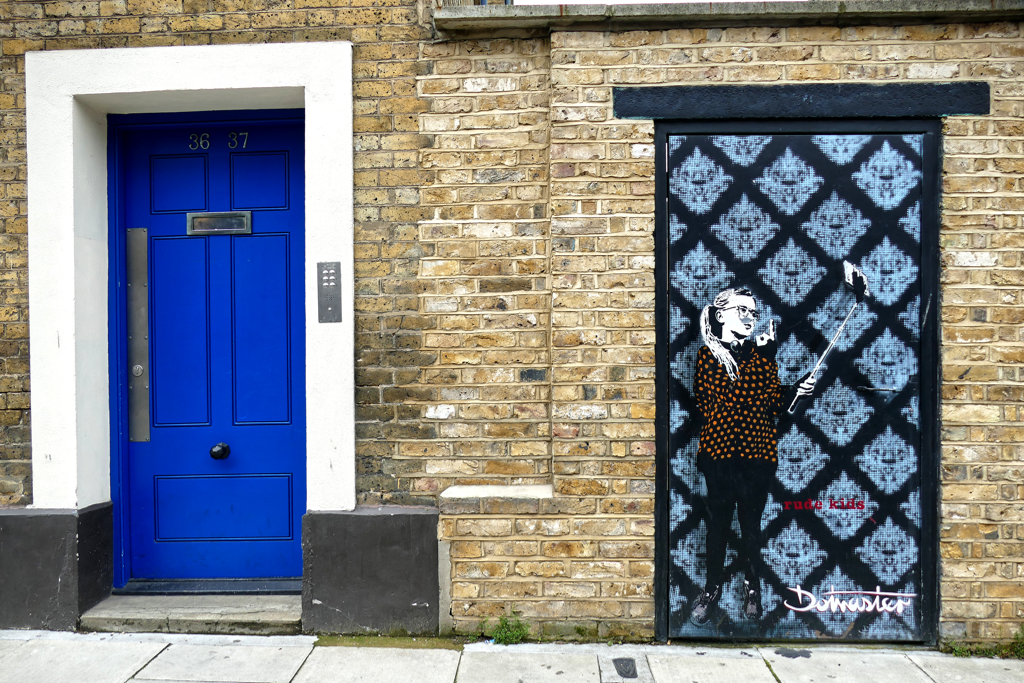
While his work is full of cheeky humor, his technique is seriously thorough. Hyper-realistic portraits in black and white are positioned in front of colored stencil background. Seesix definitely is a master. And a pro: Not only is he a driving force behind the NuArt Festival in the Norwegian city of Stavanger. He also works for luxury brands and posh festivals like Glastonbury.
Dotmaster was featured in Banksy’s film Exit Through the Gift Shop and has shown his work in exhibitions in Lisbon, Oslo, Zurich, and London , obviously.
Fanakapan
Jay Fanakapan started his career as a street artist in Bournemouth and Bristol in 2000. After completing his art studies, he made props for TV stations like MTV, Nickelodeon, and the BBC.
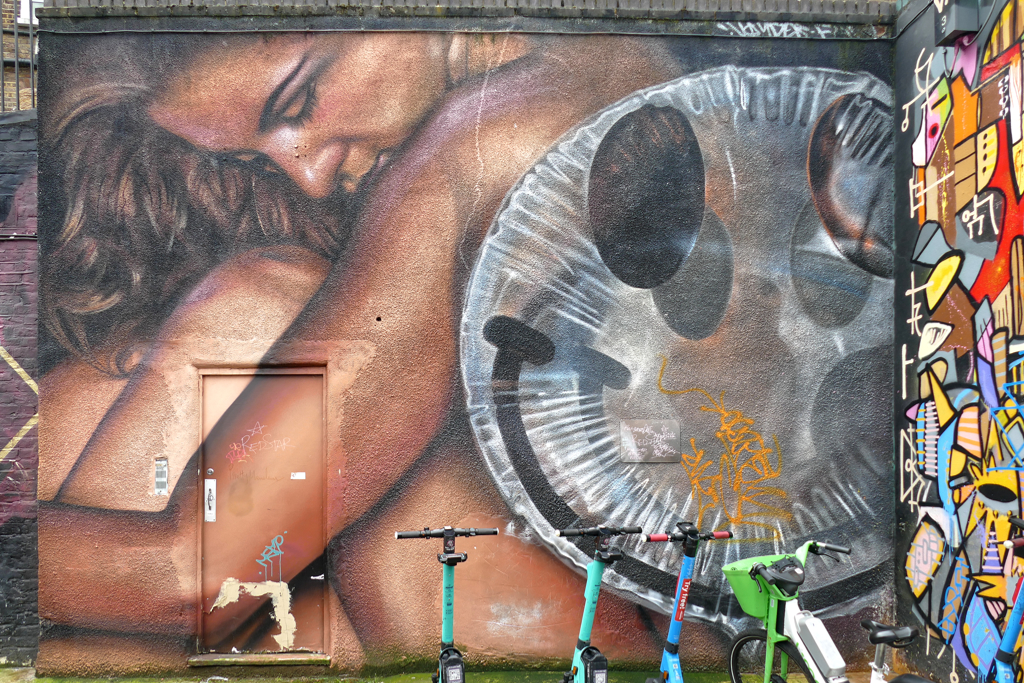
Today, Fanakapan is based in London and famous for his hyper-realistic depictions of mostly inflatable objects. From a distance, you might think the balloons in all forms and shapes are real. This is obviously due to his incredible talent and his skill to spray paint precise highlights and shadows.
I’m introducing Fanakapan also in my post about London’s street art in Shoreditch.
Voyder
Fanakapan created the above mural in cooperation with Voyder, a British muralist born in 1983. Originally from Bristol, Voyder is a self-taught multi-disciplinary artist. He mainly creates his fantastic detailed, hyper-realistic works in oil on canvas or sprayed on walls.
I especially like his paintings, which look like you look at fogged mirrors. They give the realistic portraits of women behind the mist a special intimacy.
Alongside a couple of friends, he began putting graffiti on signs’n’walls. That was not legal. It is all the more impressive that years later, he worked for created works for the Queen of England and Sir Elton John. Today, you’ll find his amazing larger-than-life photorealistic murals in Belfast and Briançon, Lyon and London, and many other places.
Irony
Another self-taught grandmaster of urban art is the muralist that goes by the name of Irony. This quite elusive artist sprays his hyper-realistic motifs freehand as if painting with a brush. Oh, this being said: He also does paint with a brush on canvas.
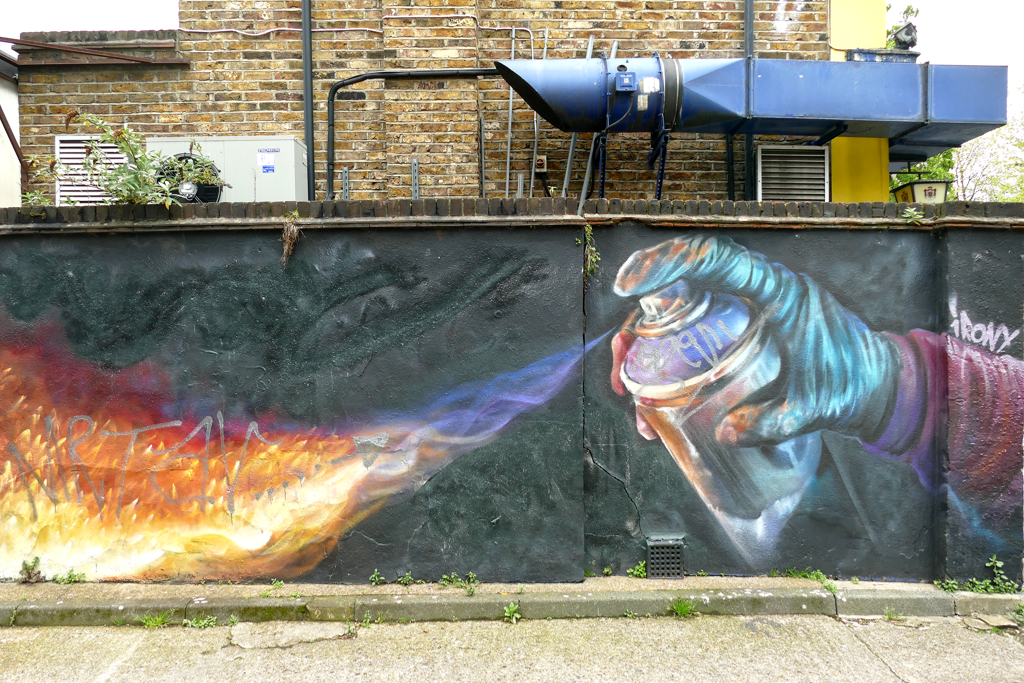
He gained notoriety mainly with his large, complex mural titled Burn. Some claim the spray can spitting fire is just a tribute to urban art while others assume a deeper meaning behind it.
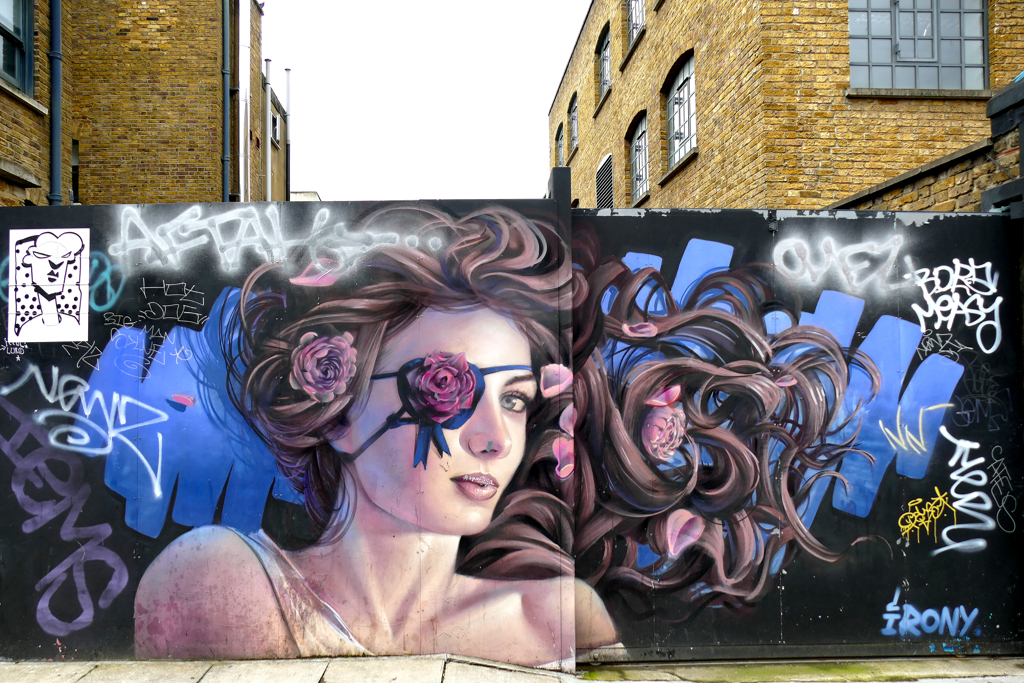
Irony often cooperates with fellow street artist Boe. Both artists prefer to remain anonymous.
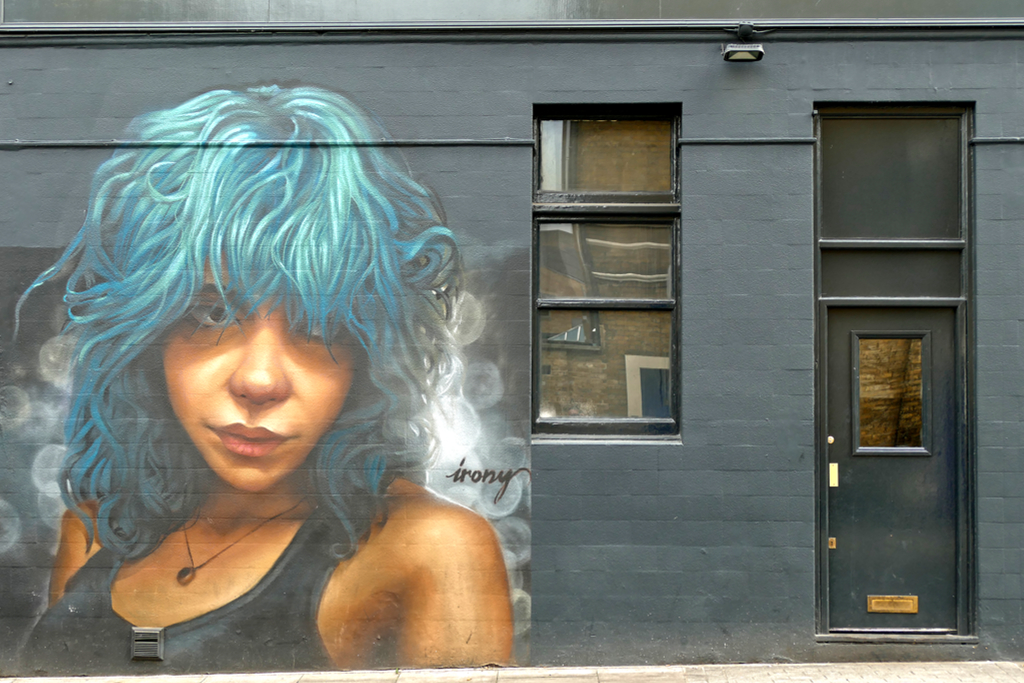
I’ve introduced Irony also in a post about street art in Bristol.
On Instagram
Unfortunately, I cannot introduce all the great artists embellishing Camden’s façades. And even those few I’m presenting above have created many more amazing pieces.
So if you want to dig deeper into the subject – or get inspired for your upcoming trip to London – check out these accounts of the above-featured artists:
AeroArts
Airborn Mark
Ant Carver
Dave Bain
Curiouser
Leon Seesix aka Dotmaster
Damitta
Fanakapan
Irony
JXC
Dan Kitchener
KOBRA
REVES
TamOonz
Voyder
Xander Coy aka Zandism
How to Get Around
When following the guide in this post, you should take the so-called tube, London’s underground, to the Mornington Crescent stop. If you’re willing to skip the murals on Miller Street, you can also get off at the Camden Town stop. To learn about your options how and how much to pay for public transportation, please hop over to my comprehensive guide to the city of London. You’ll find all the relevant info there.
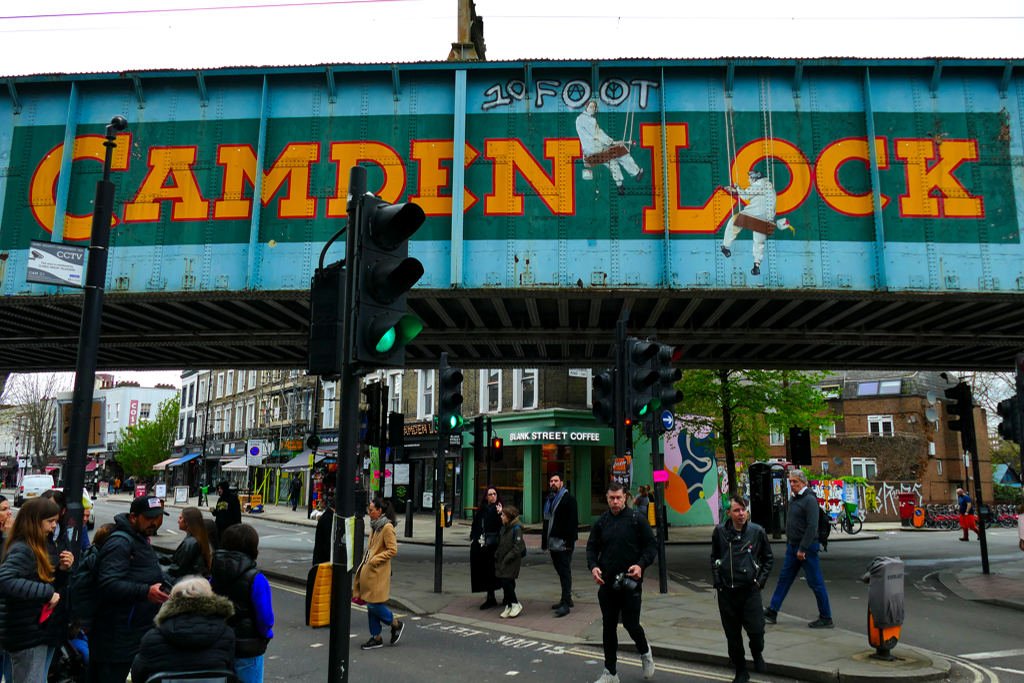
Although I refrain from referring to walking as an exclusive option to explore Camden, you will be walking a lot. Hence, take buses or the tube, as much as you can. Also, do yourself a favor and wear sensible shoes like loafers or sneakers – or even light hiking boots.
Cycling
While generally speaking, cycling is a great way of exploring cities in general and looking for street art in particular, riding your bike through the crowds in Camden might be a challenge, especially on weekends.
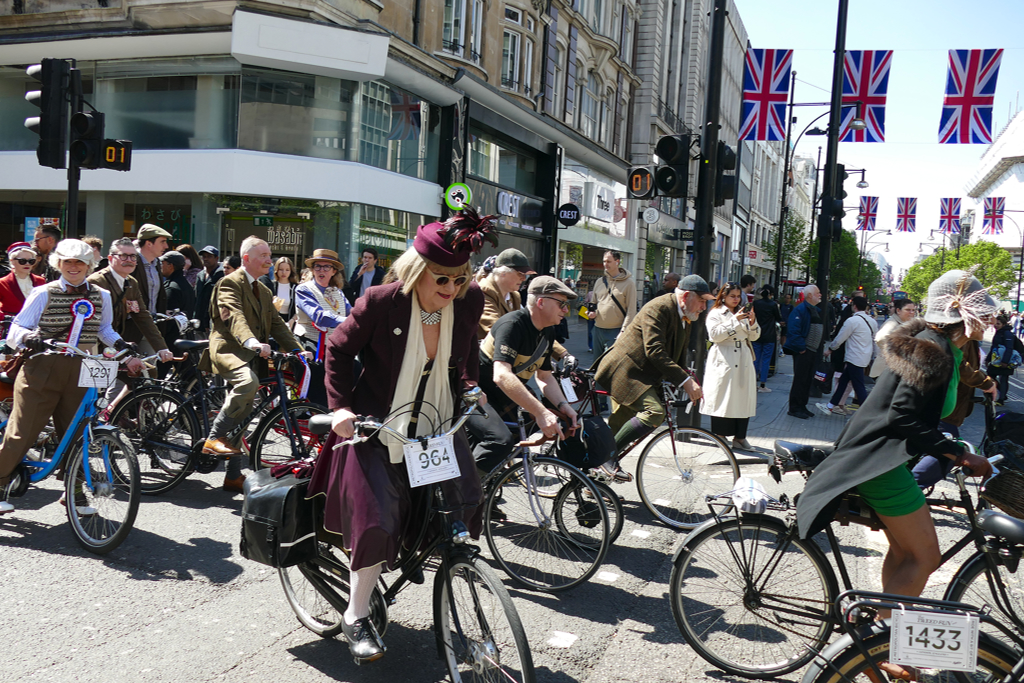
Nevertheless, since I by no means want to discourage you, I recommend you go to my post on London where you’ll find a comprehensive guide to the city’s various bicycle rental companies since London does not have one, not two, not three…no, London has actually five bike rental companies that enable you to pick up and leave a rental bike in many locations around town.
Map
This map should help you to find the murals I’m introducing in this post. However, I split it into two layers, one for Camden, and the other one for Shoreditch. This way, you can open them separately.
Clicking on the slider symbol at the top left or the full-screen icon at the top right will display the whole map including the legend.
Searching for Street Art was only one of many fun activities on my visit to London. To read about the rest, go to this comprehensive guide where you’ll find further valuable information that will make your own trip much smoother and more enjoyable. If you have only a short layover in the city, my post 24 hours in London has you covered.
Pinnable Pictures
If you choose to pin this post for later, please use one of these pictures:
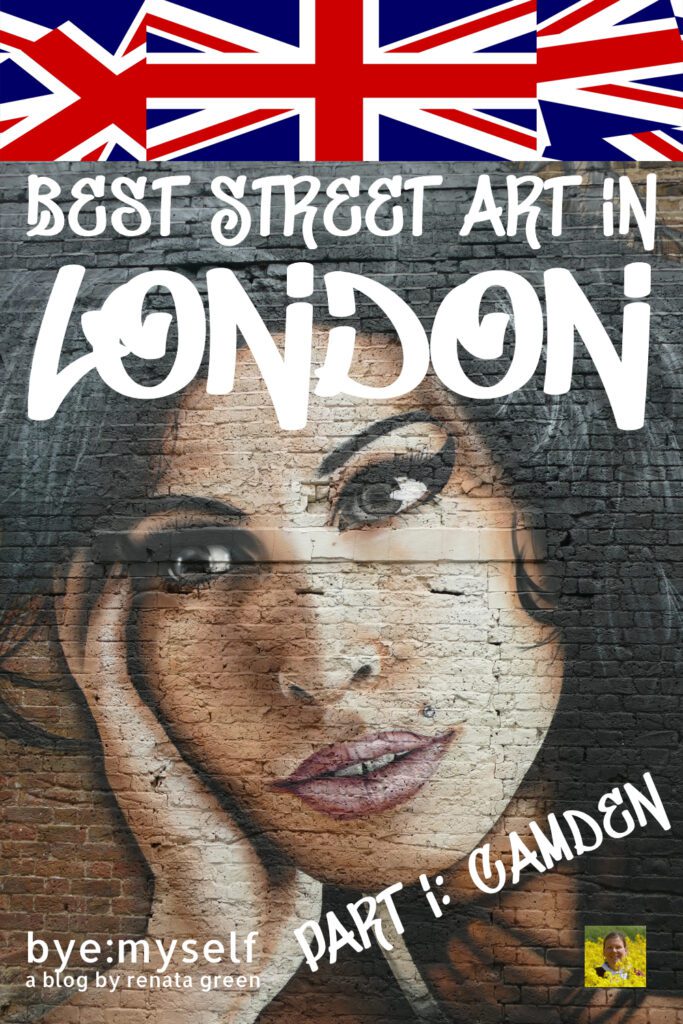
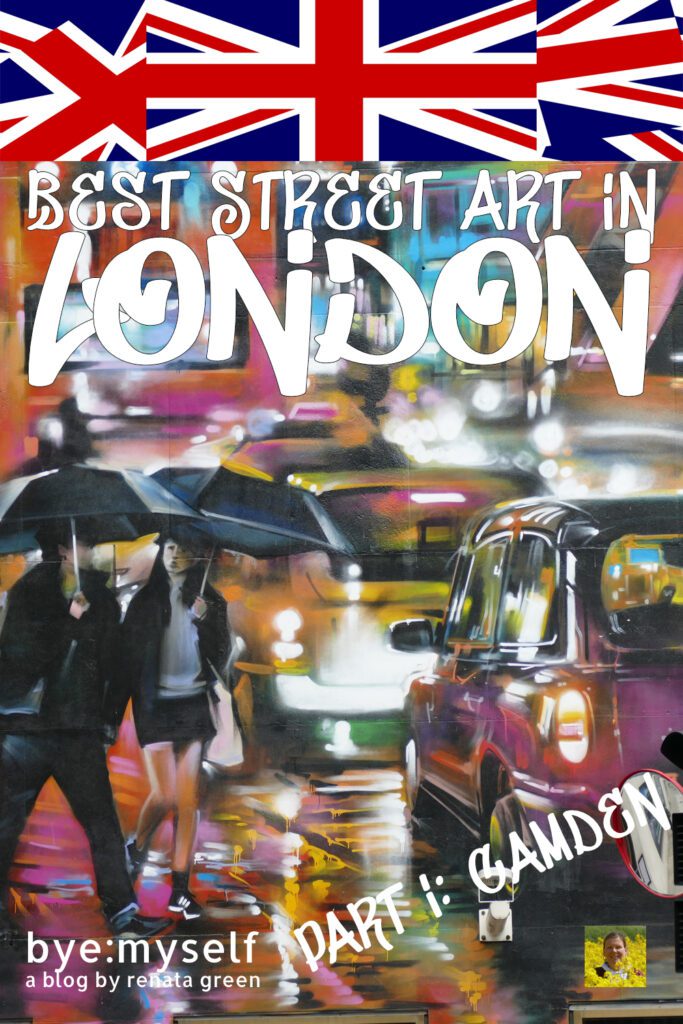
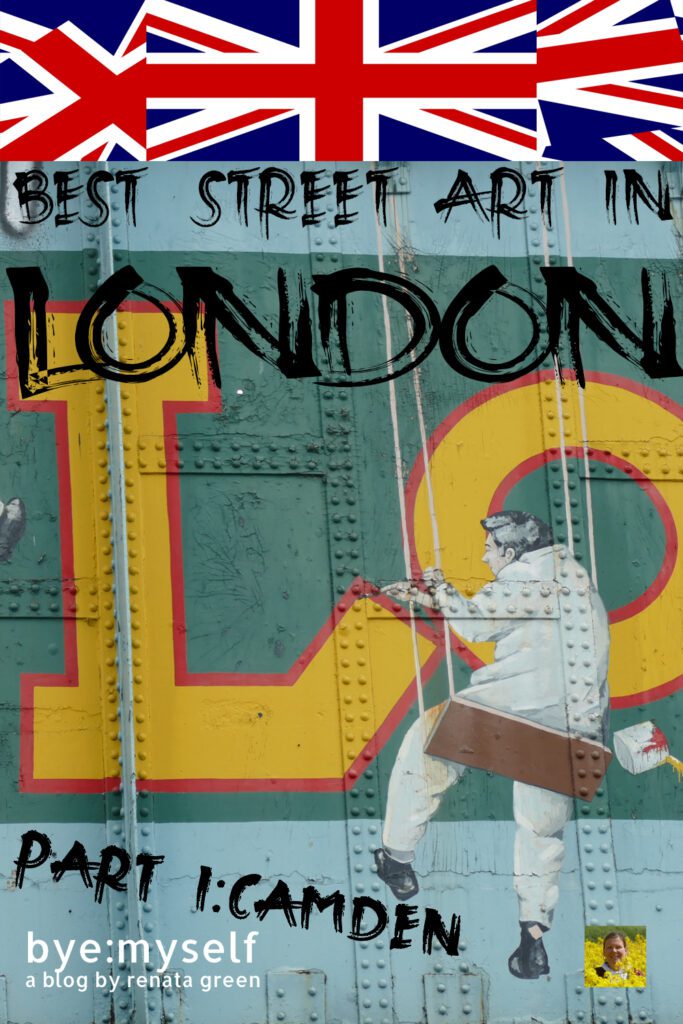
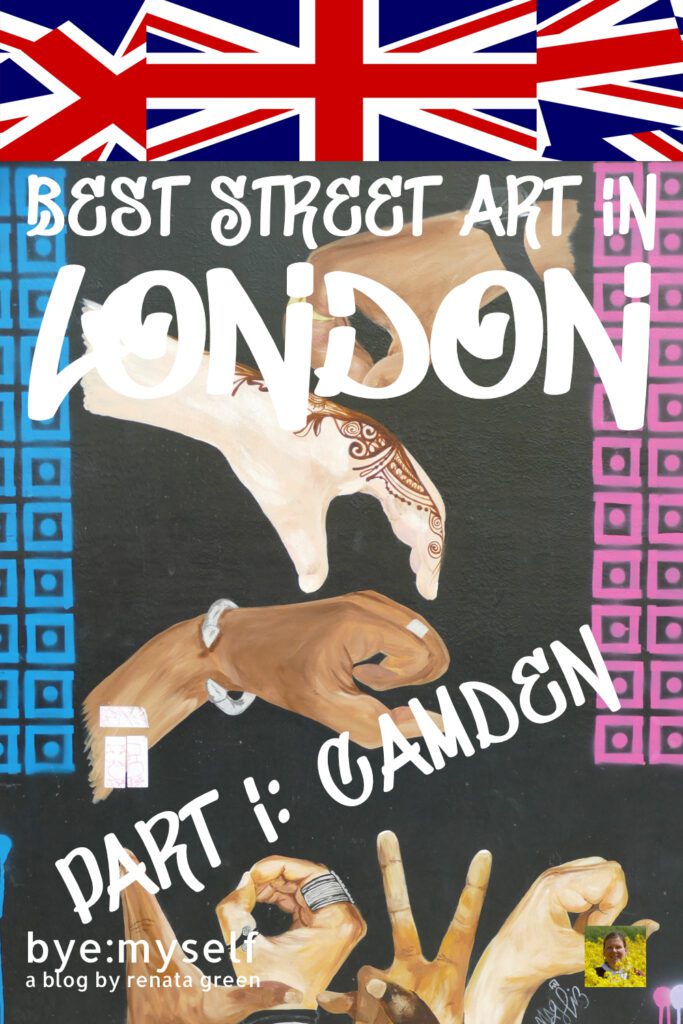
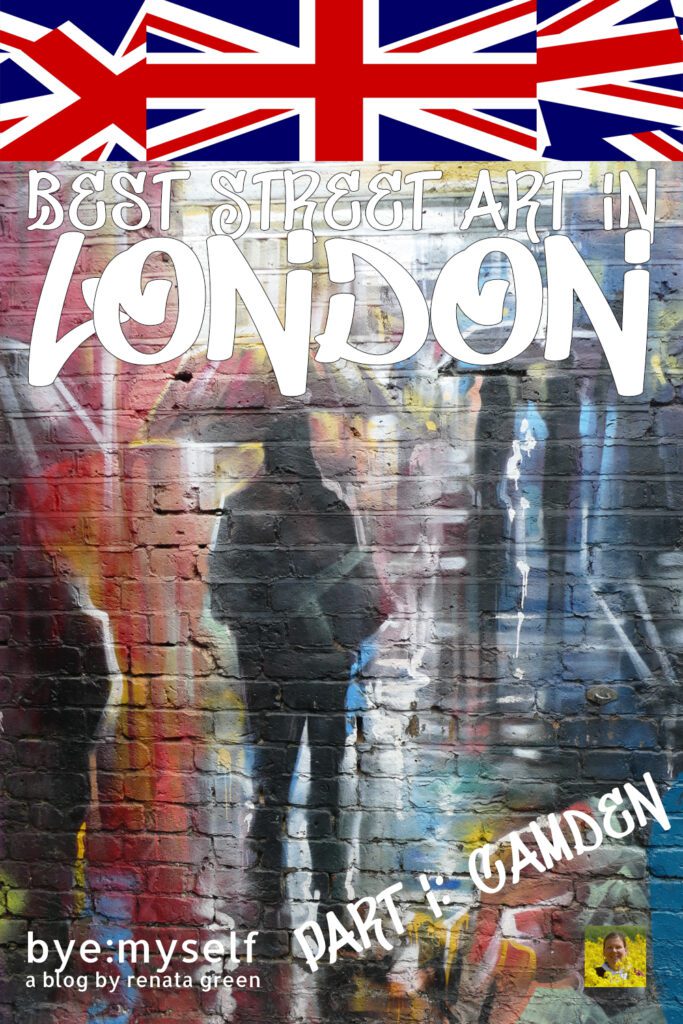
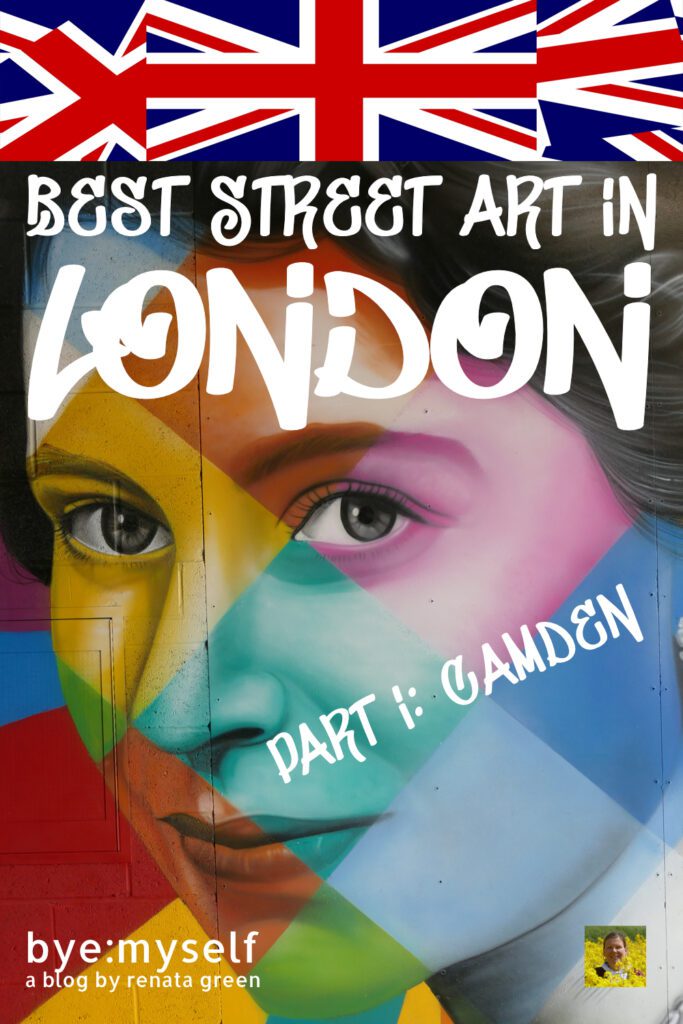
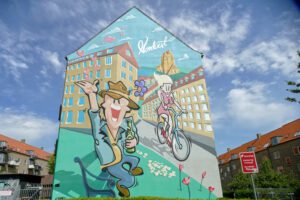
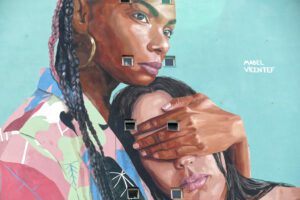
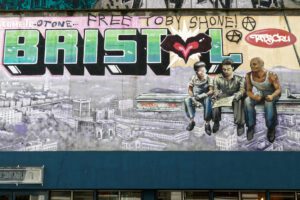
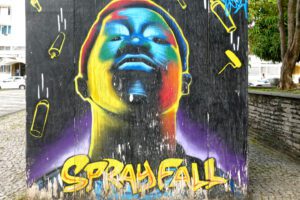
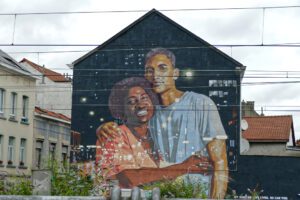
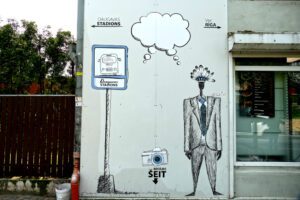
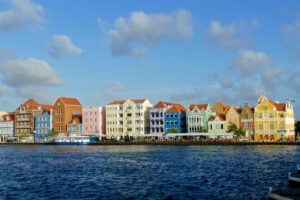

Interesting to read more about street art in London. Love some of the pieces you picked. But I now understand that they may not stick around for a long time. Such a great collection of topics. The colourful ones always draw me in. Interesting to see the young Queen Elizabether in KORBA style. Thanks for memorializing what might not stick around for long.
I love Camden when I visit London! It’s become super touristy but there are great spots to escape the crowds too. The murals by JXC and Dotstars are my favorite, they’re so cool and colourful! I think it’s a shame that Mr Zero ruined the Lana del Rey mural, it was so stunning! Cycling is so popular there, I remember seeing cycle highways now in the city. I wouldn’t do it, there are crazy drivers and cyclusts there!
That mural in the Starbucks cafe stood out for me. I think if street art is done beautifully, with intention, and good taste it would add to the charm of the place. Also, I’m curious how you know so much about the artists?
Thanks for your question: I’m doing extensive research online before writing my posts on urban art 🙂